Mossad Helped Foil 12 Terror Plots In Turkey In 2 Years - Report

A report says Israeli intelligence agency Mossad has helped foil 12 plots to carry out terror attacks on Israelis in Turkey over the past 2 years.

A report says Israeli intelligence agency Mossad has helped foil 12 plots to carry out terror attacks on Israelis in Turkey over the past 2 years.
According to Israeli Channel 12 news Saturday, most of the attacks had been planned by the Islamic State terror group but some of the thwarted schemes were reported to be Iranian operations.
It is not clear why Ankara suddenly became active in uncovering plots against Israel and networks working for Iranian intelligence. Turkey has recently signaled a desire to improve ties with Israel.
The report came a day after Turkish media announced the uncovering of an Iranian plot to assassinate Turkish-based Israeli businessman Yair Geller.
The Iranian spy cell was comprised of nine operatives, some Iranian and some Turkish, who planned to kill the Istanbul-based tycoon, who owns an engineering company specializing in aerospace and defense technology.
The hit was planned as a retaliation for the killing of Mohsen Fakhrizadeh, who was known as the "father of Iran's nuclear weapons program" and was assassinated outside Tehran on November 26, 2020, in an operation widely attributed to Mossad.
Turkish media reported Wednesday that the country’s intelligence had arrested 17 people allegedly linked to Iranian intelligence who were planning to kidnap an Iranian dissident.
The failed plot followed recent reports in Turkey of the indictment of 16 people including Palestinians and Syrian nationals arrested last October would be put on trial in Istanbul for "political and military" espionage for Israel.
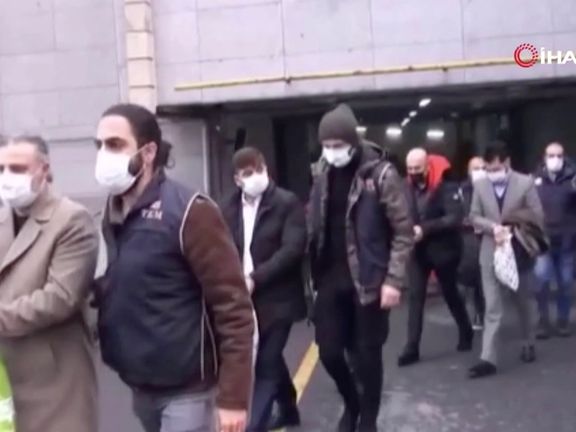
Turkey's intelligence (MIT) Friday supplied local media details of its detention of 14 Iranians and Turks it says were involved in kidnapping Iranians.
Footage shown by Turkish media Friday included arrests, searches of suspects' homes, and female suspects transferred by armed security forces.
The Turkish media also released some details of the persons involved in the alleged kidnapping ring. They claimed the leaders were two Iranian intelligence officers, named as Seyed-Mehdi Hossein and Ali Ghahraman-Hajiabad, although these were not among the two Iranians and 12 Turks arrested.
Turkey's OdaTV, a news website, last week reported that Ghahraman-Hajiabad was an Iranian intelligence office who had ‘masterminded’ a plan to kidnap an Iranian wanted by the Iranian intelligence service in Zonguldak, a city in Turkey’s Black Sea region. OdaTV put the number of arrests as 11.
Turkey's official Anadolou (Anatolia) news agency Friday relayed information from Turkish intelligence that an Iranian national among the detainees, whom it named as Morteza Soltan-Sanjari, had worked for Ihsan Saglam, a Turkish national who owns By Saglam defense company.
The report alleged that one of the Iranian intelligence officers had offered $1 million to Soltan-Sanjari and Saglam for the capture of ‘MR,’ an Iranian naval officer who had deserted. Hakan Saglam, another member of the alleged plot, had located MR and promised to smuggle him to the United States.
But the report also said the 14 kidnappers were paid $150,000 for each operation. It named
Yaghoub Hafez, an Iranian colonel, as someone successfully rendered to Tehran.
Anadolou alleged that Ihsan Saglam had tortured the person who later smuggled Hafez out of Turkey to force them to locate the colonel in Denizli province, western Turkey. Hafez was told that he was wanted by Iran, could be smuggled though Iraq to a “safe country,” but was then instead taken in February 2019 back to Iran.
Failed Plans
CNN Turk Friday said the kidnapping ring later collapsed when Turkish authorities found out that Soltan-Sanjari and Saglam and were planning to abduct “Iranian dissidents.”
In a different case, Turkey's Sabah Daily reported Friday that MIT had arrested eight Turks and Iranians over a failed Iranian plot to assassinate an Israeli businessman, Yair Geller, in Istanbul, in retaliation for the United States killing of Iranian general Qasem Soleimani in Baghdad in January 2020.
It is unclear when or whether any of these cases will reach courts. The Stockholm Center for Freedom in its 2021 report for Turkeywrote that Turkish courts “systematically accept bogus indictments, [and] detain and convict without compelling evidence of criminal activity...”
Turkey’s relations with Iran, despite trade continuing at around $10 billion in the face of US ‘maximum pressure’ sanctions, have been strained over Ankara’s support for Azerbaijan in the 2020 war with Armenia, and by Turkey’s support for militant Islamists in Syria opposing President Bashar al-Assad, an Iranian ally.
At the same time Turkey has also detained and put on trial16 individuals of different nationalities on charges of “political and military” espionage for Israel.
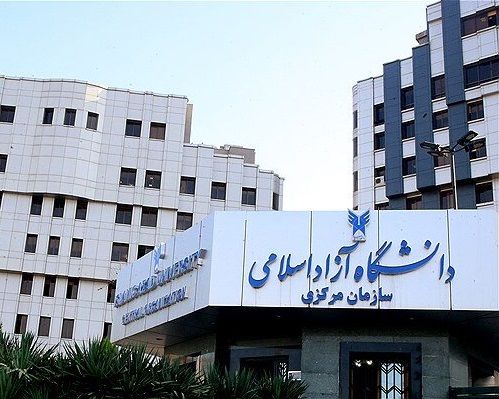
Iran’s Azad University has fired 325 professors and lecturers in recent months and has decided now to dismiss 1,500 more, Iran International TV reported.
According to information received by the station, about 40 of the professors were from the southwestern province of Kurdistan while more professors were fired in provinces with substantial religious and ethnic minorities. The university has dozens of campuses around the country.
The former head of the recruitment board at the Islamic Azad University, who resigned in September wrote in his resignation letter that about 1,800 people were referred to the authorities for severance pay, and 325 were let go.
While many critics see the layoffs as further political cleansing of academia that has accelerated since Ebrahim Raisi took office, others point to the decrease in the number of university applicants in general because of the existing economic crisis and high inflation that has impoverished the middle classes.
However, in January other Iranian universities fired three distinguished professors in what was clearly seen as apolitical move against independent academic figures.
The Islamic Republic has conducted several ‘cleansing’ operations in universities, firing professors that it has deemed not committed to the regime. The most widespread firings took place right after the 1979 revolution and repeated during the presidency of Mahmoud Ahmadinejad, who forced many professors into retirement.
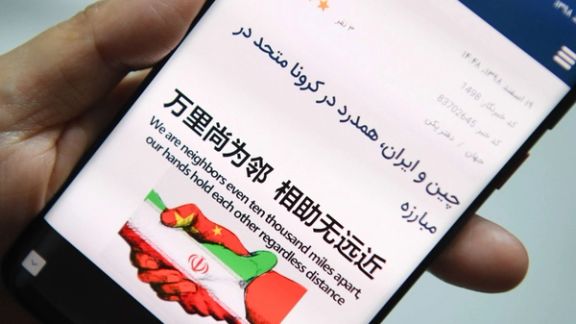
China’s large-scale efforts to control the Internet has become a viable conceptual and technical model for authoritarian regimes, like Iran's Islamic Republic.
China has combined legislative actions and technological enforcement to regulate the Internet domestically, deeming it “The Great Firewall” of China. Cybersecurity expert, Robert Potter, has said in a joint report, "China is known to be building a techno-surveillance authoritarian state domestically."
The Islamic Republic of Iran follows China’s lead in systematic oppression techniques. Shargh newspaper, a moderate publication by Iran’s authoritarian standards reported, Iran’s parliament is in the final stages of passing a bill called the ‘Cyberspace Users Rights Protection and Regulation of Key Online Services Bill’. Contrary to its name, this bill will restrict the internet and allow the Islamic Republic to gather and store citizens’ data. Under this legislation, Iran’s intelligence services and military will have authorized access to user’s data.
The Chinese Communist Party’s pursuit of surveillance is no secret. China is creating a global communications network to track and store sensitive security data. Business, intelligence, and military communications will increasingly go through an interconnected Chinese-built system. Huawei, the world’s largest telecom equipment maker, has deep ties to China’s government.
China’s second-largest telecom equipment maker, ZTE, sells to more than 500 carriers in more than 160 countries, 60 of which have questionable human rights records. In addition to selling services, China provides training programs that include subjects like ‘manipulating public opinion.’ One could China is strengthening authoritarianism in the digital age.
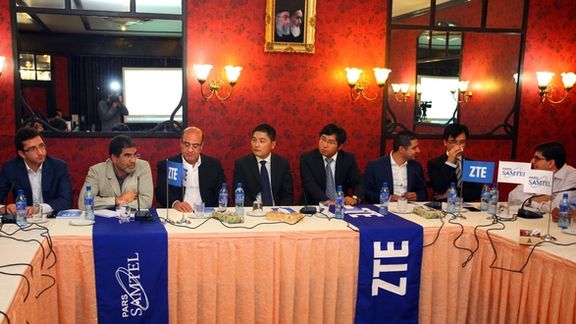
During a briefing at an annual security conference in Munich, United States’ officials have warned that China will use Huawei’s presence in future communication networks to steal corporate secrets, censor content, and track dissidents. Critics of China say the rapid rise of these tech companies stems from the theft of intellectual property. Huawei has done business with North Korea, helped Iran spy on their citizens, and created ‘back doors’ for easier intellectual property theft.
According to Zhenhua data leak, Chinese companies have harvested information from millions of foreigners on behalf of Beijing’s intelligence services. Having access to and embedding their equipment in Iran’s communication infrastructure allows China to intercept information, putting Iran’s security at risk. Data can be extremely valuable, as it lays the grounds for a country’s intelligence services’ decision-making. Chinese technology companies have reassured the public on multiple occasions that they would never share the data with the Chinese government. They may not have a choice in the matter. Article 7 of China’s National Intelligence Law requires organizations and citizens to, “support, assist and cooperate with the state intelligence work.” This law gives the Chinese government unauthorized access to data, undermining whatever assurance Chinese tech companies may make.

While some countries have erected barriers to contain China’s security threat and ‘hybrid warfare’, Iran’s regime has opened its arms to Chinese technology and embraced China’s utilization of technology against citizens. Chinese technology will bring more digital forms of oppression and surveillance to Iran, further worsening human rights issues.
China has been enabling heavier digital oppression in Iran since 2010. The timing was no coincidence. Following the 2009 disputed elections in Iran, widespread anti-government protests threatened to overthrow Iran’s regime. China’s assistance helped the Islamic Republic double down against dissent. Suppression of an ever-increasing number of critics is at the center of Iran’s domestic policies and the regime’s very survival. Iran’s notorious Revolutionary Guard in cooperation with the clergy have turned the country into a military-religious state determined to keep the ruling elite in power, looking to combine its system of oppression with technology.
Enter China. Iran’s regime looks up to China as the perfect prototype. China saw the opportunity in 2010 to provide a solution. A report by Reuters shows ZTE, sold Iran’s largest telecoms firm (TCI)a “powerful surveillance system capable of monitoring landline, mobile, and internet communications.” Iran’s regime has used these technologies on numerous occasions. The internet was shut down during a water crisis in Khuzestan and Esfahan. Internet shutdowns will limit the population’s ability to express discontent or communicate with each other and the outside world.
ZTE’s marketing team refers to this spying as a “turnkey solution for lawful interception.” A new system called ZXMT was installed into ZTE’s network, which helps utilize a “deep packet inspection”—a powerful and intrusive technology that can be used to track internet users, search for, and reconstruct email messages, block types of traffic, and even deliver web pages to users. In a 91-page document called, “Talking to the Future”, ZTE notes ZXMT systems can be utilized for military and national security agencies, adding that it would also be, “invisible to targets.” In other words, the Iranian government can trace every online request to blocked websites back to the user, without the user’s knowledge. Andrew Lewman, the executive director of The Tor Project, which helps dissidents in countries like Iran and China surf the internet undetected said, “Iran has been using deep packet inspection since 2010 to monitor and block internet traffic.”
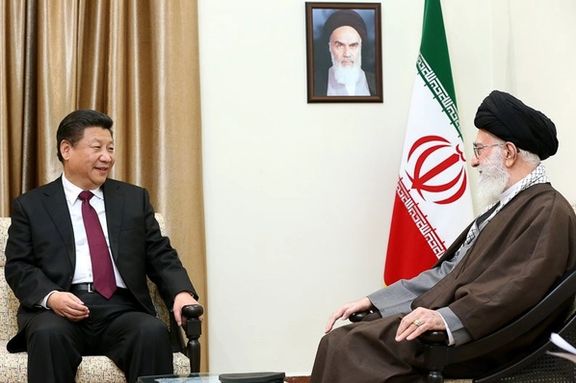
Iran and China renewed their ties in 2022 by signing a 25-year strategic cooperation agreement. China plans to invest $400B in Iran, which includes a 4G-5G network, most likely provided by Huawei. Saeid Golkar, an expert on Iranian security, points out that Iran will either duplicate or buy these systems from China. He adds “As Iran becomes more digitized, I’m sure that we will see more digital forms of oppression and surveillance.”
China’s tech companies have targeted dictatorships and democracies alike. Britain has taken the financial bait, undermining its national security by trying to save money on a less expensive Chinese infrastructure. Thousands of public institutions in Britain currently have Chinese-owned security systems, like camera surveillance, watching students, government workers, and citizens. Britain’s Metropolitan Police, hospitals, and universities use Hikvision cameras—the same company enabling police agencies in Xinjiang to detain an estimated 3 million Muslim Uyghurs. A Chinese official anonymously leaked a 403-page set of internal papers to The New York Times hoping that it spreads the word. China runs over 1,000 concentration camps in Xinjiang, as part of a “People’s War on Terror,” where they have been accused of torture, sexual abuse, widespread sterilization, and the killing of detainees. Leaked files show that in one town alone, more than 400 children have lost one or both parents to some form of internment. China has denied all accusations of human rights abuses in Xinjiang and insists the detainees are in “vocational training” facilities. British officials and human rights campaigners say Chinese state-owned companies such as Hikvision and Dahua provide the “technological infrastructure” for the oppression of Muslim Uyghurs in China.
IPVM, the world's leading surveillance information source, reports Tiandy, another massive Chinese tech company linked to the oppression of Uyghurs, sells surveillance equipment to Iran’s government to be used in its military and law enforcement. Tiandy cameras are equipped with “facial recognition” as well as “ethnicity tracking” technology. The infamous “tiger chair,” a documented torture device, has been linked to Tiandy’s “smart” interrogation technology. The device is widely used on Uyghur detainees in Xinjiang. Uyghur survivors have confirmed these allegations in British courts. Families of those who speak on these crimes soon vanish or are apprehended. Authoritarian countries use these fear techniques to harass activists and stop the tales of their tyranny from being broadcasted to the world.
These surveillance systems are usually framed as necessary for combating rising crime and terrorism to keep citizens safe. However, these technological advancements are more often used to empower state crime and terror against citizens. The step-by-step guide to an authoritarian regime’s survival in the 21st century is to spy on, gather data from, censor and control knowledge of, and ultimately score citizens. Censorship and surveillance are not the Islamic Republic’s only two technological aspects of interest. Iran’s regime has implemented the Chinese “social credit” system, which is used to rate citizens based on their behavior, activities, and finances. China uses this system to blacklist millions of its own citizens and take away rights from citizens as they please. Individuals can be banned from flying, getting health insurance, and in some cases, getting fined to the point of financial ruin.Maya Wang, a senior China researcher for Human Rights Watch, says, “The social credit system gives a very powerful weapon to officials, in a country with very unbalanced relations between citizens and the government.” Iran’s regime shares this characteristic with China. The Islamic Republic’s record of crimes against humanity raises concerns, as China continues to enable them to rule with impunity.
To vividly illustrate how the Islamic Republic operates domestically, compare the severity of different types of crimes in the eyes of the Islamic Republic of Iran. According to a women’s rights NGO in Ahvaz, 60 women have fallen victim to ‘honor killings’ in the past two years in Iran. None of the perpetrators have been brought to justice, as most honor killings go unpunished. Rokna, the website that reported a recent honor killing of a 17-year-old in Ahvaz, was taken down by the government due to “publishing images and issues that violated public decency.” While the killers of the victims roam free, three Iranian women are serving 55-year sentences for disobeying the Islamic Republic’s dress code. They were charged for, "disrespecting compulsory hijab… assembly and collusion to act against national security… [and] encouraging and preparing the grounds for corruption and prostitution." In another case, a mother and daughter were jailed for 9 years for giving out flowers without headcovers as a form of peaceful protest to compulsory hijab. Providing a regime that implicitly condones ‘honor killings’, and peaceful protests as “crime” with the latest technology will only lead to catastrophe for their people.
There is no arguing technological advancements are extraordinary and humans have come a long way, but our future is in danger of being hijacked. China’s methods are spreading around the world and their propaganda machine is going to be embedded in democracies as well as dictatorships. China has already meddled in both the 2016 and 2020 U.S. Presidential elections. Facial recognition technology helps authoritarian leaders identify and prevent the organization of protests, and blacklist protestors. Authoritarian regimes will censor information, and brainwash citizens. Reporting on humanitarian issues in these countries will no longer be possible. Information will be controlled, and reality skewed. Authoritarians are using this technology to wage a war on our very basic freedoms. These leaders are behind disinformation campaigns that distract from the underlying truth that they see their people as an expendable human stock. Yeonmi Park, a North Korean survivor explains how China has enabled North Korea’s crimes for years in her book, In Order to Live. When she finally escaped North Korea, she said, “It amazed me how quickly a lie loses its power in the face of truth.”
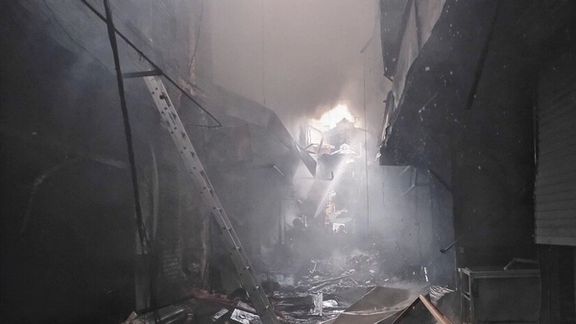
A large blaze that started at 7:38 Saturday morning, local time in Tehran’s bazaar has engulfed at least 30 businesses, according to the city’s fire department.
Jala Malaki, spokesperson of the department told local media that the fire started in one of the older parts of the sprawling bazaar when all shops were still closed. Around 30 retail businesses were completely engulfed by the fire and some walls have collapsed, he said.
Authorities had not announced the extent of monetary damage and losses as of noon local time, and there was no word about possible casualties. There is also no information about the possible causes of the incident.
Fire crews from at least six stations were battling the blaze almost five hours after it started.
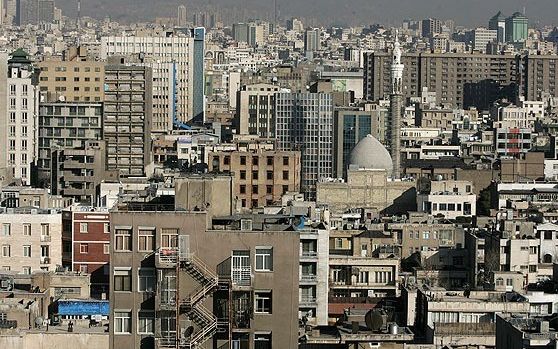
Rents in the Iranian capital Tehran increased by 54 percent in January compared with last year, as annual inflation hovered around 40 percent and demand rose.
Real estate prices have increased sevenfold since 2018, which has put pressure on rents, experts say. Although home prices have not risen much in recent months, rents keep climbing because there is a time lag between purchase price increase and rents.
In some instances, rents equal the total income of a wage earner who is paid about $150 a month in a fulltime job. Meanwhile, food prices rose by 60 percent in 2021 compared with the previous year.
Home prices rose in local currency because real estate is a major asset protecting savings in a country like Iran where the national currency has lost value almost eightfold since 2017. In countries without an internationally accepted currency, wealth can disappear with devaluation and people rush to protect their capital.
Calculated in US dollars, real estate prices have stayed the same in four years.
Rising home prices in local currency pushe the middle class out of the market and increases demand for rentals.
Pundits and politicians in recent weeks have been warning of a social explosion in the country if the economy does not improve soon. Iran is negotiating with the United States over its nuclear program. An agreement can lift US sanctions and provide much-needed revenues.